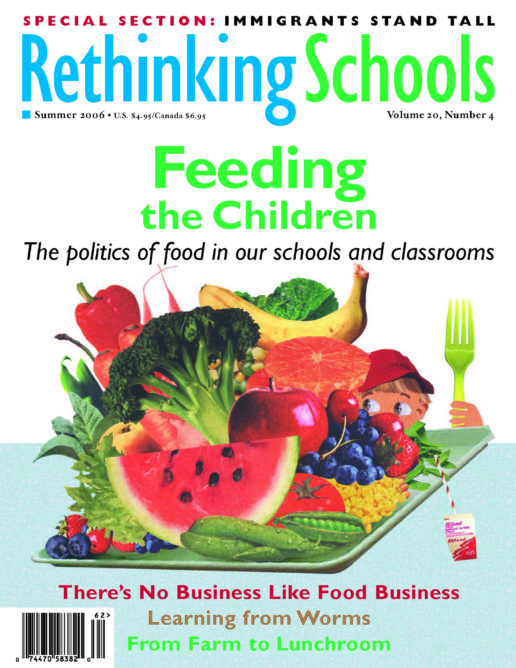Reviews 20.4
Resources to help teachers and students delve into the economics and politics of food
The True Cost of Food (2004)
Sierra Club’s Sustainable Consumption Committee
15 minutes
www.truecostoffood.com
The True Cost of Food, a production of Free Range Graphics (makers of www.themeatrix.com), is a 15-minute animated short that contrasts the Wal-Martized industrial food market with local and organic food systems, illustrated by a farmers market. The film’s imagery and graphic depiction of the corporate industrial food complex provide solid fodder for discussion and analysis.
Highlighting food items like industrial tomatoes and factory farmed meat, The True Cost of Food offers a stark depiction of the true, and more often than not, hidden cost of the food we eat. Unfortunately, by featuring a white, middle-class mom who does all the shopping and cooking, the video steers clear of the issues regarding access and justice in the food systems it contrasts. The True Cost of Food is accompanied by a comprehensive discussion guide that supplies educators with resources and topics for further dialogue.
Future of Food (2003)
Deborah Koons Garcia and Lily Films
www.futureoffood.com
Produced and directed by Deborah Koons Garcia, Future of Food is a beautifully crafted documentary that spans from Canada to Mexico, bringing together several key parts of the battle against biotech corporations and genetically engineered foods. While providing a concise history of industrial agriculture, Future of Food extensively details the commodification of life embedded in the United States’ intellectual property rights regime. The story of Percy Schmieser, the Canadian canola farmer who was sued by Monsanto, is particularly illuminating.
But the film shortchanges the vibrant and diverse international movement that is resisting genetic engineering and advancing community-based alternatives. While the film certainly is powerful, its bland analysis of corporate control of the food system limits its effectiveness as a teaching and organizing tool. In providing market-based “alternatives” to genetically engineered foods (e.g., “eat organic”), Future of Food avoids the more difficult and necessary discussion of how to radically change our food system.
Other good films on genetic engineering include Unnatural Selection (www.seedsofdeception.com/utility/showPage/index.cfm?objectID=public,5041), a comprehensive European film, and Fed Up! (www.wholesomegoodness.org).
The Greening of Cuba (1996)
Food First / www.foodfirst.org
38 minutes, VHS/DVD
Spanish (English subtitles)
The Greening of Cuba illustrates the island’s struggle for survival after the fall of the Soviet Bloc in 1990 and the loss of nearly all its pesticide and fertilizer imports and half its petroleum. Facing the threat of famine, Cuba undertook the largest conversion to organic agriculture ever. Told in the voices of Cuban women and men, ranging from organic farmers and gardeners to professional researchers, The Greening of Cuba takes the viewer on a journey through Cuba’s countryside and urban gardens, exploring the successes and challenges of its ever-evolving national organic food crusade.
The Greening of Cuba shines in showcasing an equal balance of Cuban women and men, of both Afro-Caribbean and European descent and from both rural and urban communities. Possibly the greatest lesson from The Greening of Cuba is not the country’s remarkable display of true sustainability, but rather the importance of an engaged and educated society in confronting a national crisis.
A new documentary, The Power of Community: How Cuba Survived Peak Oil (www.communitysolution.org/cuba.html), is a welcome addition to the discussion around food, community, and working alternatives.
What Will We Eat?: The Search for Healthy Local Food (2005)
26 minutes
Available from Chris Bedford (chrisbedford@charter.net)
Filmed in “middle America,” What Will We Eat? explores our national crisis of food insecurity, investigating industrial agriculture’s impact on local communities, the environment, and our food supply. Focusing on Michigan’s Sweetwater Local Foods Market, the film introduces us to a grassroots alliance of family farmers and concerned consumers, united in their joint search for local and sustainable alternative to agribusiness-as-usual.
What Will We Eat? may lack a big Hollywood budget, but it certainly makes up for it with real people living the change they want to see in the world. In addition to the voices of local concerned citizens, the film includes sustainable agriculture visionaries like Fred Kirschenmann of the Leopold Center for Sustainable Agriculture. Bedford also has a shorter film, Food for the Future, which highlights the Floyd Boulevard Local Food Market, the first farmers market in the nation to exclusively sell humanely raised animal products and organic/chemical free produce.
The Meatrix
(www.themeatrix.com and www.themeatrix2.com)
A 6-minute spoof of The Matrix, focusing on the dangers to the environment and human health caused by factory farming.

